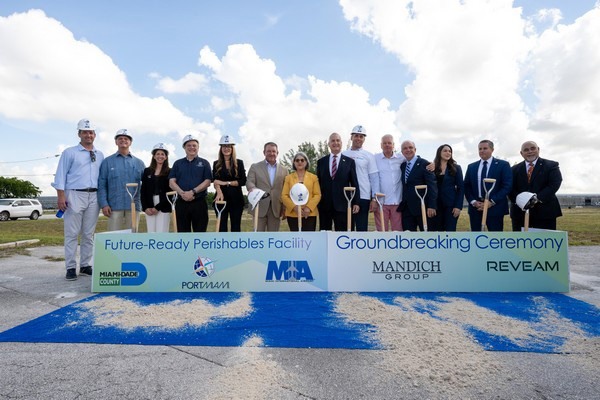The goal is big: a new, $141 million facility in Florida's Miami-Dade County that promises to change the way fresh produce is treated, stored, and distributed in the region. Groundbreaking on the 340,000-square-foot facility took place in mid-July, and it's set to open in 2027.
"This is going to completely change the way we handle perishables entering and leaving South Florida," says Chip Starns, founder, chief regulatory officer and EVP at Reveam. "By combining USDA-certified, non-chemical phytosanitary treatment with one of the largest high-capacity cold chain operations in the country, we're removing two of the biggest pain points for growers and shippers—inspection delays and temperature breaks. Everything happens under one roof, right here at PortMiami and MIA, which means faster clearance, less spoilage, safer and fresher produce on store shelves."
To start with, in the facility, which is being built in partnership with the Mandich Group, Cold-Link Logistics, PortMiami, and Miami International Airport, approximately 20 percent of the space is dedicated to advanced phytosanitary technology. The remaining 80 percent is for cold storage logistics, including state-of-the-art refrigerated warehousing, loading docks, and office space. In all, over 20,000 TEUs per year will be accommodated with more than 35,000 pallet positions for chilled and frozen storage, supporting high-throughput operations and efficient supply chain integration.
 © ReveamStarns says the facility is going to change the way perishables enter and leave South Florida.
© ReveamStarns says the facility is going to change the way perishables enter and leave South Florida.
Extending shelf life and more
In phytosanitary, the facility will feature USDA-approved phytosanitary irradiation capabilities powered by Reveam's proprietary Electronic Cold-Pasteurization® (ECP®) platform. This integrated system meets import/export requirements, which helps extend shelf life, reduce spoilage organisms and foodborne pathogens, and enables treatment in final packaging. It's a heat-free and chemical-free process that works for a range of products, including produce.
In cold chain processing capabilities, this includes a 50-foot clear height for high-density racking, dedicated freezer and cooler storage, and logistics services such as import/export handling, cross-docking, inventory management, case picking, wrapping, unitization, pallet building, up/down stacking, labeling, load consolidation, temperature reduction, floor loading and unloading, lumping, repalletization, and EDI integration.
While this initiative is a first in Florida, there are cold storage facilities and separate chemical treatment centers in other parts of the world, though this promises to be the largest in the U.S. to fully integrate advanced electron-beam phytosanitary treatment with large-scale cold chain logistics. "We drew on lessons learned from our Rio Grande Valley ECP Center in McAllen, Texas, where we treat imported fruits and vegetables from Mexico, Peru, South Africa, Colombia, and beyond, as well as handle export programs like reopening South Carolina and Georgia peach shipments to Mexico," says Starns. "That experience proved how powerful it is to pair advanced chemical-free and heat-free treatment with high-throughput logistics, and this new facility takes that model to an entirely new scale and strategic location."
 © ReveamGroundbreaking on the 340,000-square-foot facility took place in mid-July, and it's set to open in 2027.
© ReveamGroundbreaking on the 340,000-square-foot facility took place in mid-July, and it's set to open in 2027.
How does this help growers-shippers?
In all, this facility means growers and shippers will be able to move product faster, which helps maintain the freshness of produce items, as well as be able to do it more cost-effectively. Starns says the facility is eliminating extra handoffs and reducing the time produce spends outside ideal temperature conditions.
"For shippers, it means fewer logistical headaches and lower costs. For growers, it means greater confidence their products will arrive in peak condition - whether that's going across the state or the globe," says Starns. "This facility strengthens Florida and other Southeastern producers' export capabilities, giving local growers a strategic advantage to reach global markets."
While the technology is effective on more than just produce items–that includes fresh flowers–this also means new specialty items can be introduced to the market, and there's greater capability to handle higher volumes of staples such as citrus, berries, and tropical fruit. "With the capacity to treat and store over 1.5 million tons a year, we're ready to support both diversification and growth in trade," says Starns.
 For more information:
For more information:
Michael Young
Reveam
Tel: +1 (470) 359-3660
https://reveam.com/
